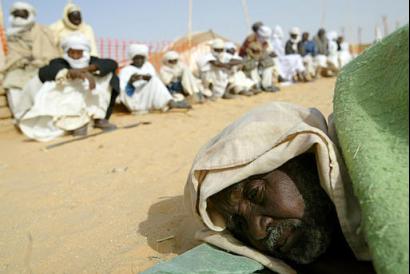“We don’t know why they are bombing us” : civilians bear brunt of Sudan’s latest war

By Beatrice Debut
TINE, Chad, Jan 27 (AFP) — A fly was feasting on the blood-soaked bandage wrapped around Moukthar Abakar’s shredded cheek as he lay in a hospital bed in a Chadian town close to the border with Sudan, where he was injured last week, and from where one could still hear the sound of exploding bombs.
Abakar is among more than 100,000 refugees in Chad from Sudan’s Darfur region, where for almost a year government troops backed by militia groups have been fighting rebels who took up arms to protest their marginalisation by Khartoum.
The only medical facilities in Tine, an arid town on the Chadian side of the border, are being provided by the Belgian wing of Medecines sans Frontieres (Doctors Without Borders, MSF).
“I was grazing my cows and sheep in the Cornaye wadi when I saw a distant plane open up,” mumbled Abakar. It is difficult for him to talk now because his upper jaw has been fractured.
“It must have been about 11:00 am. I didn’t think they would go for me… Afterwards, I don’t remember. I was unconscious for two days before they brought me here by camel and then in a car,” he said.
Such bombardments are frequent in Darfur. An AFP journalist witnessed one such raid Monday afternoon on the Sudanese side of Tine, where several bombs fell about 20 metres (yards) away from a group of journalists and rebels.
There were no injuries that time, but according Abubker Hamid Nour, an official of the rebel Movement for Justice and Equality who escorted reporters to the deserted streets, such attacks occur daily.
While Khartoum and the main rebel group in the south, the Sudan People’ Liberation Army, inch closer to a comprehensive peace deal, fighting in Darfur has intensified since talks between the protagonists broke down on December 16.
Ten days ago, MSF had to deal with a large influx of refugees.
“We had to open a surgical ward because the nearest hospital, in Abeche, is eight hours away by road,” explained hospital coordinator Nuria Serra.
“Planes target villages where there are civilians, but the rebels are outside,” said Abakar, his left eye weeping uncontrollably and blood coagulating under his nose.
“We don’t even know why they are bombing us,” said another patient, Sabour Mohamat, 15, whose left leg has had to be amputated.
“We don’t know the rebels. We just want to be free to graze our cattle,” added the herdsman, who, like Abakar and three friends lying in neighbouring beds, was wounded while doing just that.
“The others are dead,” said Mohamat.
A man hobbled into the next tent, his gangrenous right foot wrapped in a dusty blue and white towel.
“I was wounded ten days ago and came here on a donkey. Because of the bombing, we only moved at night,” said the man, Bechir Mohamat, 22.
His turbaned father watches over his son until he is taken into the operating theatre to have his foot cut off.
“The problem is that people come here with infected wounds because there is no means of transport,” explained MSF surgeon Viatcheslav Sviridov.
He has operated on 68 patients over the last week.
A little later the wind picked up and the air filled with sand, all but obscuring a camel train passing in front of the hospital tents.
Tell-tale booms echoed from across the border. Another bombing raid.
